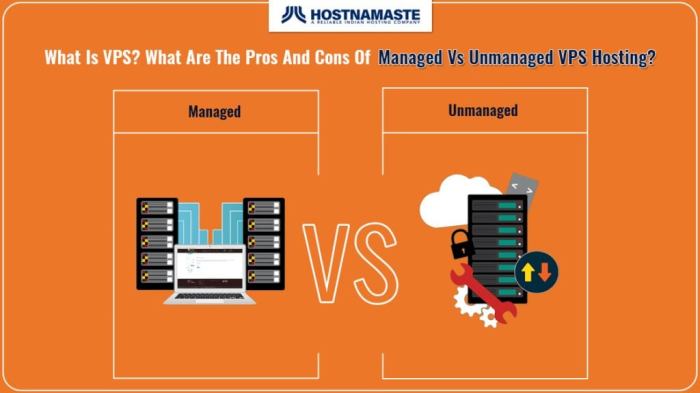Understanding VPS Hosting: Is It Right for Your Business? This question is crucial for businesses seeking reliable and scalable hosting solutions. VPS hosting, or Virtual Private Server hosting, offers a middle ground between shared hosting and dedicated servers, providing a balance of affordability, performance, and control.
Imagine having your own dedicated space on a powerful server, offering a level of control and resources not found in shared hosting environments. VPS hosting allows businesses to enjoy enhanced security, dedicated resources, and greater flexibility, all at a price point that’s often more manageable than a dedicated server.
What is VPS Hosting?

VPS hosting is a type of web hosting that provides a virtualized server environment. It allows multiple users to share a physical server, but each user has their own dedicated resources, such as RAM, CPU, and storage space. This provides a more secure and reliable hosting solution than shared hosting, while being more affordable than dedicated hosting.
VPS Hosting vs. Shared Hosting
Shared hosting is a budget-friendly option where multiple websites share the same server resources. This means that the performance of your website can be affected by the activity of other websites on the server. VPS hosting offers a more isolated environment, ensuring that your website’s performance is not affected by other users.
How VPS Hosting Works
VPS hosting works by dividing a physical server into multiple virtual servers, each with its own operating system and resources. This is achieved through virtualization technology, which creates a virtual environment on the physical server. Each virtual server operates independently, allowing for greater control and security.
Key Features of VPS Hosting
VPS hosting offers several key features that make it a popular choice for businesses:
- Dedicated Resources: Each VPS has its own dedicated resources, ensuring that your website has the resources it needs to perform optimally.
- Root Access: VPS hosting typically provides root access, giving you full control over your server environment.
- Increased Security: VPS hosting offers a more secure environment than shared hosting, as your website is isolated from other users.
- Scalability: You can easily scale your VPS resources up or down as your website’s needs change.
- Cost-Effective: VPS hosting is a more cost-effective option than dedicated hosting, offering a balance of performance and affordability.
Advantages of VPS Hosting for Businesses
VPS hosting provides businesses with a powerful and versatile solution that addresses many of the challenges associated with shared hosting. By offering a dedicated portion of a physical server’s resources, VPS hosting delivers enhanced security, performance, and flexibility compared to shared hosting.
Increased Security
VPS hosting significantly enhances security compared to shared hosting. Because each VPS is isolated from other virtual servers, it reduces the risk of attacks or vulnerabilities affecting other websites hosted on the same physical server. This isolation ensures that malicious activities on one VPS cannot impact other VPS instances, protecting your website and sensitive data.
VPS hosting offers a more secure environment for businesses, especially those handling sensitive data or requiring robust security measures.
Dedicated Resources for Better Performance
VPS hosting provides dedicated resources, including CPU, RAM, and storage, for each virtual server. This ensures consistent performance, even during peak traffic periods, unlike shared hosting where resources are shared among multiple websites. Dedicated resources eliminate performance bottlenecks and ensure that your website loads quickly and efficiently, improving user experience and overall website performance.
VPS hosting provides predictable and consistent performance, which is crucial for businesses that rely on their websites for revenue generation or customer engagement.
Flexibility and Control
VPS hosting offers businesses greater flexibility and control over their hosting environment. Users can customize their server’s operating system, software, and configurations to meet specific business requirements. This flexibility allows businesses to tailor their hosting environment to optimize website performance, security, and scalability.
VPS hosting empowers businesses to manage their hosting environment efficiently and effectively, ensuring optimal performance and security for their websites.
Choosing the Right VPS Hosting Plan: Understanding VPS Hosting: Is It Right For Your Business?

Choosing the right VPS hosting plan is crucial for ensuring optimal performance and scalability for your business. This decision depends on various factors, including your website’s traffic, resource requirements, and budget.
Understanding Key VPS Hosting Plan Features
It is essential to understand the different features of VPS hosting plans and how they relate to your business needs. These features directly impact your website’s performance, security, and overall user experience.
- RAM: Random Access Memory (RAM) is the temporary storage space your website uses to process information. More RAM means faster processing speeds, leading to quicker page loading times and improved user experience. For websites with high traffic or resource-intensive applications, you’ll need more RAM. A good rule of thumb is to start with at least 1 GB of RAM and scale up as needed.
- Storage: Storage refers to the space available on your server to store your website files, databases, and other data. The amount of storage you need depends on the size of your website and the amount of data you store. For websites with large amounts of content or media files, you’ll need more storage. VPS hosting plans typically offer various storage options, ranging from a few gigabytes to hundreds of gigabytes.
- Bandwidth: Bandwidth refers to the amount of data that can be transferred between your server and users’ devices within a specific time. Higher bandwidth allows for faster page loading speeds and improved user experience, especially for websites with large images, videos, or high traffic. The bandwidth you need depends on the amount of data your website transfers, the number of visitors you receive, and the type of content you host.
Comparing VPS Hosting Providers
When choosing a VPS hosting provider, it’s essential to compare different providers based on their features, pricing, and customer support. Here are some factors to consider:
- Pricing: VPS hosting plans can vary significantly in price, depending on the features offered. Compare prices from different providers to find the best value for your money. Consider factors such as monthly fees, setup costs, and renewal rates.
- Features: Different VPS hosting providers offer various features, such as control panel access, security features, and backup options. Choose a provider that offers the features you need to run your website smoothly and securely. Features such as daily backups, DDoS protection, and advanced security measures can be crucial for businesses.
- Customer Support: Reliable customer support is essential for resolving any technical issues you may encounter. Look for a provider that offers 24/7 support via phone, email, or live chat. Consider providers with a proven track record of excellent customer service and response times.
- Performance: VPS hosting providers often have different server locations and network infrastructure. Choose a provider with a good track record of uptime and performance, as this can significantly impact your website’s availability and speed. Consider providers with data centers located in regions close to your target audience to minimize latency and improve user experience.
Factors to Consider When Choosing a VPS Hosting Plan
Here are some factors to consider when choosing a VPS hosting plan:
- Website Traffic: The amount of traffic your website receives is a crucial factor in determining the resources you need. High-traffic websites require more RAM, storage, and bandwidth than low-traffic websites. Estimate your current and future traffic needs to choose a plan that can handle the load.
- Resource Requirements: Different websites have different resource requirements. For example, websites with large databases, complex applications, or multimedia content require more resources than simple websites with static content. Assess your website’s resource needs to choose a plan that can meet those requirements.
- Budget: VPS hosting plans can range in price, so it’s essential to consider your budget. Choose a plan that offers the features and resources you need without breaking the bank. Consider long-term costs, including monthly fees, renewal rates, and potential upgrades.
Setting Up and Managing a VPS Server
Setting up and managing a VPS server may seem daunting at first, but with the right tools and knowledge, it can be a smooth process. This section will guide you through the steps involved in setting up your VPS server, exploring different operating systems and software options, and explaining how to manage security and updates effectively.
Setting Up a VPS Server
Once you have chosen a VPS hosting provider and selected a plan, you will need to set up your server. The setup process usually involves the following steps:
- Choose an Operating System (OS): VPS servers offer a variety of operating systems, such as Linux distributions (Ubuntu, CentOS, Debian) and Windows Server. The choice depends on your specific needs and the applications you plan to run. Linux distributions are generally preferred for their stability, security, and wide range of open-source software. Windows Server is often chosen for its compatibility with specific applications and tools.
- Connect to the Server: You will need to use an SSH client (Secure Shell) to connect to your VPS server. This allows you to access the server’s command line interface and execute commands remotely.
- Install Necessary Software: After connecting to the server, you can install the software required for your applications. This may include web servers (Apache, Nginx), databases (MySQL, PostgreSQL), programming languages (Python, PHP), and other tools.
- Configure Security: Security is crucial for VPS servers. You should configure firewalls, update software regularly, and implement strong passwords to protect your server from unauthorized access.
- Deploy Your Applications: Once your server is set up and secured, you can deploy your applications and make them accessible to users.
Operating Systems and Software
VPS hosting offers flexibility in choosing your operating system and software. Popular choices include:
- Linux Distributions: Ubuntu, CentOS, Debian are widely used for their stability, security, and extensive software repositories.
- Windows Server: Offers compatibility with specific applications and tools, particularly for businesses using Microsoft software.
- Web Servers: Apache and Nginx are popular choices for serving websites and web applications.
- Databases: MySQL and PostgreSQL are commonly used for storing and managing data for websites and applications.
- Programming Languages: Python, PHP, Node.js, and others are used for developing web applications and other software.
Managing Security and Updates
Maintaining a secure and up-to-date VPS server is essential. Here are some key practices:
- Regular Software Updates: Keep your operating system and all installed software updated to patch vulnerabilities and improve security.
- Firewall Configuration: Configure your server’s firewall to block unauthorized access and restrict incoming and outgoing traffic.
- Strong Passwords: Use strong and unique passwords for your server and any applications installed on it.
- Security Monitoring: Implement security monitoring tools to detect suspicious activity and potential threats.
- Backups: Regularly back up your server’s data to ensure you can restore it in case of data loss or system failure.
Real-World Examples of VPS Hosting Use Cases

VPS hosting provides a scalable and reliable solution for businesses of all sizes, particularly those with specific performance, security, and resource requirements. It’s not just a technical concept; it’s a practical solution for real-world challenges faced by businesses across various industries.
E-commerce Websites
E-commerce businesses rely on fast loading times, secure transactions, and high availability to ensure customer satisfaction and drive sales. VPS hosting offers a significant advantage for e-commerce platforms by providing dedicated resources and control over the server environment.
- Increased Performance: Dedicated resources ensure faster page loading times, even during peak traffic hours, improving user experience and potentially boosting conversion rates.
- Enhanced Security: VPS hosting offers enhanced security features, such as firewalls and intrusion detection systems, to protect sensitive customer data and financial transactions.
- Scalability: As an e-commerce business grows, its resource needs increase. VPS hosting allows for easy scaling of resources to accommodate increased traffic and transaction volumes, ensuring seamless growth.
Gaming Servers, Understanding VPS Hosting: Is It Right for Your Business?
Online gaming requires low latency, high bandwidth, and dedicated resources to deliver a smooth and enjoyable gaming experience. VPS hosting provides the ideal environment for hosting gaming servers.
- Reduced Latency: Dedicated resources and proximity to players minimize latency, leading to faster response times and a more responsive gaming experience.
- High Bandwidth: VPS hosting offers high bandwidth to accommodate large amounts of data transfer required for online gaming, ensuring smooth gameplay without lag.
- Customizability: VPS hosting allows for customization of server configurations to optimize performance for specific games and player bases, ensuring a tailored gaming experience.
Software Development
Software development teams often require a controlled and secure environment for testing, deploying, and managing applications. VPS hosting provides a dedicated and flexible platform for these activities.
- Development and Testing Environments: VPS hosting allows developers to create isolated development and testing environments, preventing conflicts and ensuring stability during development cycles.
- Version Control and Deployment: VPS hosting provides a platform for managing version control systems and deploying applications, facilitating efficient development workflows.
- Security and Compliance: VPS hosting offers enhanced security features to protect sensitive data and code, meeting compliance requirements for software development projects.
Whether you’re an e-commerce store, a gaming platform, or a software development company, VPS hosting can be a powerful tool for your business. By understanding the benefits, choosing the right plan, and managing your server effectively, you can leverage the power of VPS hosting to achieve your online goals.
Query Resolution
What are the common types of VPS hosting plans available?
Common VPS hosting plans include managed VPS, unmanaged VPS, and cloud VPS. Managed VPS offers hands-on support for server management, while unmanaged VPS gives you complete control. Cloud VPS provides scalability and flexibility, allowing you to adjust resources as needed.
How do I choose the right VPS hosting provider?
Look for a provider with a good reputation, reliable uptime, and strong customer support. Consider their pricing, features, and scalability options. It’s also important to check their security measures and data center locations.
Is VPS hosting suitable for beginners?
While VPS hosting offers more control, it requires a certain level of technical knowledge. If you’re new to server management, consider starting with a managed VPS plan or seeking assistance from a hosting provider.